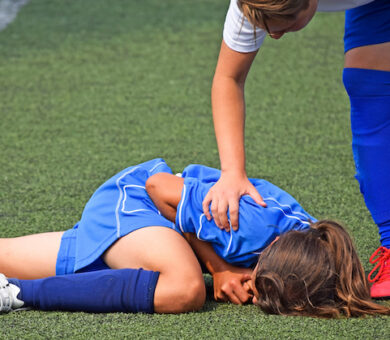Obstacles to Healthy Eating for Athletes
You get up in the morning and rush through breakfast, grabbing whatever is fast and easy. The night before, you make the decision that you would rather sleep longer than eat a balanced or healthy breakfast.
During your first couple hours of class, you begin snacking on tasty, quick sugary foods. You’re hungry because you either didn’t eat much breakfast or you grabbed something small and it wasn’t enough to fuel your morning.
Lunch rolls around, and you are starving. You don’t like the cafeteria meals at lunch, so you go off-campus and grab a meal at the nearest restaurant. You are only allotted 30 minutes for lunch and then have to get back for class, so your food choices are limited to fast food.
By the time you get to your afternoon classes, you are hungry again and find some leftover fries from lunch or that PopTart you forgot to finish earlier in the day. Or maybe you grab some cookies that you were able to snatch up from the cafeteria or that fast food restaurant.
Does any of this sound familiar to you?
It doesn’t get any easier in college. Eating healthy as a student-athlete is hard!
Why Is Eating Healthy Hard?
When asked this question, most student-athletes say one or more of the following:
- I don’t have time – I’m always on the go.
- Healthy food is expensive – I buy cheap food.
- I get bored and hungry in class, so I eat.
- I have to eat quickly right before practice – this usually means something with sugar.
- Homework makes me crave sugar and carbs.
- I get up so early in the morning – I don’t take time to sit and eat.
- I stay up late at night, therefore I munch.
- I don’t want to eat a lot of carbs (females especially).
- I dislike anything green! – I’m picky!
- I’m a vegetarian – I’m limited.
- I need gluten-free food – it’s hard to find.
This list could go on and on. I’m sure you can name a few more reasons. These are all legitimate reasons to not eat the healthiest foods while trying to balance being a student-athlete.
So what’s the answer?

How to Overcome Not-So-Good Eating Habits
Like most things you are involved in, if you want to do it well, it takes a lot of practice and commitment.
One important point to remember and highlight for yourself is this: it’s not about losing weight. That should not be the goal, even though it could be a side-effect.
Here are some ways to help you make that happen:
Plan Ahead
This takes some forethought, but it can be done. Take five minutes on Sunday to look at your calendar for the week. Plan your meals like you plan your days. For example, you might have games on Tuesday and Friday, late practice on Monday and Wednesday, and Thursday practice right before school.
Dinner:
- Monday and Wednesday, I can eat at home before practice.
- Tuesday and Friday, I’ll eat a pre-game meal and then eat again after the game (lighter).
- Thursday, I’ll eat after practice.
Lunch:
- In school all week, I’ll pack my lunch so I have control over what I eat.
- On game days, I want to eat more carbs.
Breakfast:
- Eat a little lighter before practice on Thursday. Pack another light snack for after practice.
Most weeks will look different from one another, but, if you plan ahead, you can at least have food ready when you need it, instead of having to “grab” something on the go. If you need gluten-free or vegetarian options, planning makes even more sense.
After you have an idea of how the meals will fall throughout the week, you can begin to consider what each meal is going to be. For example, you could have leftovers from the weekend on Monday and Tuesday, either for dinner or lunch, depending on what it is. You could also pack more nutrition bars for busy days so you have them ready. In this way, you might avoid raiding the vending machines at school.

Stay Committed for Performance
Healthy eating is not just for competition, and it’s not just for game day. Good nutrition fuels every part of your day. Your academic performance and your athletic performance depend on your fueling for success.
Tips:
- Ask a friend, teammate, or significant other to do it with you and hold each other accountable.
- Ask your parents to really help you plan and shop.
- Offer to go to the grocery store for, or with, your parents and choose the foods you need.
- Make it a challenge – how many weeks in a row can I do this?
- Make it a team-building activity with your team.
- Make it a game; to win the day, I can only have “ your number” sugar treats this week.
Boost Your Willpower
Your body and your mind can work together on this. Doing this without your mind behind it is harder than if you let your willpower lead the way. You do this without even thinking about it when you compete. You tell yourself to push harder on that sprint. You tell yourself to outrun or jump your opponent in competition. You can tell yourself to eat right at the next opportunity.
Tips:
- Set aside one-minute willpower talks (i.e. my willpower is kickin’ it).
- Add other positive affirmations (i.e. I am strong; My body feels good; I have energy, etc.).
- Journal your goals and affirmations.
- Share your talks, goals, and affirmations with a friend or family member.
- Read an empowering book.
- Listen to an empowering podcast.

Give Yourself Rewards
When you have a competition, the rewards come during the game and after the game, if you win. During the game, if you have a good play or you score, that is a victory, but the game is not over. When you come to the end of the competition, you either win or lose.
Think of your nutrition journey like that of a game. You get small rewards during the game, like with a good day of eating, and then you have a reward at the end of the competition – a date set by you.
Tips:
- Avoid making your reward food-related.
- Reward yourself with something you really want.
- Make it a group reward with your friends if they meet the goal with you.
- Ask your parents if you can “get out of something” if you meet your goal.
Allow Some Cheat Days
Cheat days are those where you allow yourself to be less stringent about the foods you are eating.
Tips:
- Set them up ahead of time (date and how many/week or month).
- Avoid gorging on these days.
- Eat fun foods that you enjoy.
- Make fun foods.
- Lose the guilt.
If you are at this point and you think, “I can’t do this,” you are wrong. The first couple of weeks, it may seem like a headache to do all this planning. However, once it becomes more of a habit and you begin to feel the benefits, it will become easier. When your body feels good and you know you are performing your best, you’ll confirm for yourself that your nutrition decisions are paying off.
Championship athletes know their bodies, and they learn how to fuel themselves for best performance results.


